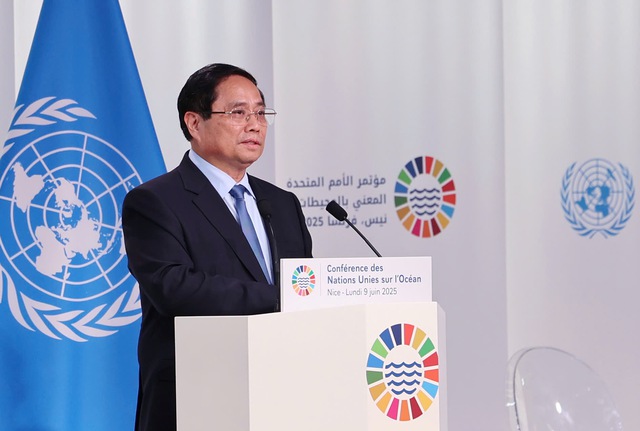Prime Minister Pham Minh Chinh delivers keynote speech at 2nd plenary session of UN Ocean Conference
VGP - Prime Minister Pham Minh Chinh delivers a keynote speech at the 2nd plenary session of the 3rd United Nations Ocean Conference in Nice, France on June 9.

Prime Minister Pham Minh Chinh delivers a keynote speech at the 2nd plenary session of the 3rd United Nations Ocean Conference in Nice, France, June 9, 2025. Photo: VGP
Speaking on behalf of 10 ASEAN Member States, Pham reaffirmed that ASEAN upholds the 1982 United Nations Convention on the Law of the Sea, which remains the constitution of the ocean, setting out legal framework within which all activities in the oceans and seas must be carried out.
ASEAN expects that the 3rd United Nations Ocean Conference would galvanize unity, secure bold ocean commitments, forge strategic partnerships, and catalyze transformative action for sustainable ocean action, stressed Pham.
He called for faster and more drastic actions with the collective efforts of nations, regions and the entire world to conserve and use blue ocean in a more sustainable manner.
To achieve that, Prime Minister Pham suggested the need for a scientific approach that is inclusive, people-centered, and comprehensive.
From that perspective, Pham put forward six key directions:
First, policy making should be rooted in scientific evidence combined with traditional knowledge.
It is neccesary to deepen our understanding of marine ecosystem to fully access economic, social and environmental impact and leverage indigenous knowledge. This would ensure harmony between marine economic development and conservation of marine biodiversity as well as preservation of people's lifestyles, cultural traditions, and identities.
Seond, it is essential to promote science an technology, innovation and digital transformation as a new driver for sustainable marine economic development.
Third, the international community should untilize resourcesfor developing the marine economy. The State plays a facilitating role, bussinesses take the lead, the people actively participate and benefit from this process, international partners and financial institutions provide support. Public-private partnerships should be actively promoted.
Fourth, an integrated cross sector approach to ocean and marine governance should be adopted.
Fifth, it is vital to foster inter-regional, cross-border and transcontinental connectivity, establishing a network of blue marine economic hubs.
Sixth, it is essential to uphold international solidarity and cooperation in conservation and sustainable development of the oceans and seas.
The United Nations should play a central coordinating role in initiatives and cooperation programs. International law should serve as a coordinated action among nations based on fairness, equality and mutual benefits.
With the consistent policy of being a friend, an active and responsible member of the international community, Viet Nam has been working closely with partners to take comprehensive and strong actions at various levels to realize the goal of conserving and sustainablly using the marine environment, noted Pham.
The ocean: Facts and figures:
• The ocean generates 50 per cent of the oxygen we need, protecting and enabling human activities.
• The ocean acts as a carbon sink. It absorbs 30 per cent of all carbon dioxide emissions and captures 90 per cent of the heat generated by these excess emissions.
• More than 150 million jobs depend on sound management and sustainable production, export, import and consumption of ocean-based goods and services - in fishing, aquaculture, shipping, coastal tourism, offshore wind energy and marine biotechnology.
• Ocean habitats such as mangroves are some of the most carbon-rich ecosystems on the planet, storing on average 1,000 tons of carbon per hectare in their biomass and underlying soils.
• The ocean and its biodiversity provide our global community with 15 per cent of the animal protein we eat. In least developed countries, seafood is the primary source of protein to more than 50 per cent of the population.
The ocean is in crisis:
• Rising ocean temperatures are raising new concerns for coral reefs, which support a quarter of marine species, generate trillions of dollars in revenue annually and provide key resources for hundreds of millions of people in coastal communities.
• As of April 2024, sea surface temperatures had reached record highs for 13 consecutive months.
• The sustainability of global fishery resources declined from 90.0 per cent in 1974 to 64.6 per cent in 2019 and further to 62.3 per cent in 2021, due to overfishing, pollution, poor management and other factors.
• Each year, it is estimated that 5 to 12 million metric tons of plastic enter the ocean, a figure set to double or triple by 2040.
• An estimated 60% of the world's marine ecosystems have been degraded or are being used unsustainably, and over 50% of marine species face the threat of extinction by 2100.

